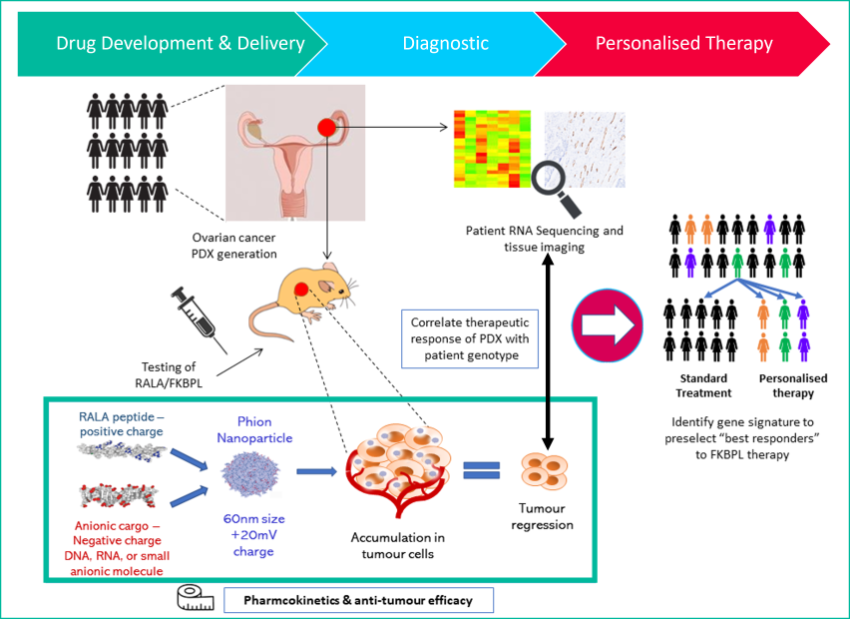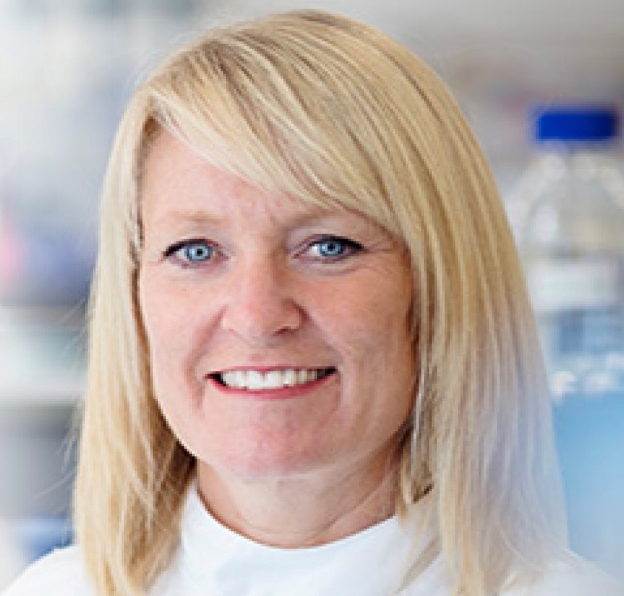Plain Language Summary
Ovarian cancer is the 8th leading cause of cancer death among women, with five-year survival rates of 20-40%. High grade serous ovarian cancer is the most common type of ovarian cancer. Approximately 25% of these patients are resistant to the standard chemotherapy treatment and will succumb to their disease in less than a year. The remainder will initially respond well to chemotherapy, but unfortunately two thirds of these patients will subsequently experience a recurrence, which is incurable. As such, ovarian cancer is a disease with unmet clinical need, and new therapies are urgently required.
FKBPL is a gene which can suppress tumour growth. We have previously developed a cancer therapy based on a short segment of FKBPL, called a peptide. While this was effective at suppressing tumour growth, peptides are very quickly degraded in the body, and require daily injection under the skin, reducing patient compliance and increasing treatment cost.
In this POI project, we will use a novel drug delivery system called RALA. This binds to the FKBPL gene to make tiny stable structures called nanoparticles. These are not degraded in the body when injected into the bloodstream, and can enter tumour cells effectively and destroy them. This project is a strategic collaboration between Prof. Robson’s group and our industry partners, Phion Therapeutics.
Together with our clinical collaborator, Prof. Donal Brennan, we will also undertake in-depth genetic analysis of tissue samples from HGSOC patients to better understand which patients are most likely to benefit from our novel FKBPL-based therapy. This will allow clinicians to identify, at the point of diagnosis, which patients should receive this treatment.
Visual Abstract

Figure 1: FKBPL nanomedicine as a novel therapy for ovarian cancer
Project Overview
Ovarian cancer (OC) is the 8th leading cause of cancer death among women with five-year survival rates of 20-40%. High grade serous ovarian cancer (HGSOC) comprises 60-80% of epithelial OCs. It initially responds well to the standard platinum/taxane regimen, but relapse rates are ~70%, and recurrent disease is incurable. In addition, 20-25% of patients have platinum resistant disease at the time of diagnosis and have a median survival of 6 to 12 months. As such, OC is a disease with unmet clinical need and new therapies are urgently required.
We have previously developed a FKBPL-derived peptide for cancer therapy. Here, we will use the complete FKBPL gene with a novel nanomedicine delivery system, to overcome difficulties with peptide based therapies, and fully exploit the anti-angiogenic and anti-migratory properties of FKBPL. We will also conduct a pilot RNAseq profiling study to identify HGSOC patients who are most likely to respond to FKBPL-based therapy.
The project is a strategic collaboration between Prof. Robson’s group and our industry partners, Phion Therapeutics. Therapeutic peptides have a poor pK and require daily subcutaneous delivery, reducing patient compliance and increasing cost. Here, we will deliver the complete FKBPL transgene for sustained expression and maximum efficacy using Phion’s patented RALA next generation nanoparticle delivery vehicle. RALA is highly efficient at delivering therapeutic transgenes to inhibit tumour growth, and we have successfully used RALA-FKBPL to target breast cancer. RALA is tumour specific, resulting in a 30x enhanced efficacy at the tumour site, following systemic delivery.
RALA/FKBPL delivery, pharmacokinetics, distribution and efficacy will be tested in vitro and in vivo, using ovarian cancer cell line models and patient-derived xenografts. Working with our clinical collaborator, Prof. Donal Brennan, we will deploy RNAseq of primary HGSOC tissue to develop a diagnostic gene expression signature identifying patients most likely to respond to FKBPL-based therapies. RNAseq data will be integrated with multiplex biomarker panels and high quality digital imaging in order to obtain a robust gene expression signature for responders to FKBPL-based therapies.
The outcome of this project will be targeted and functional RALA/FKBPL nanoparticles that specifically accumulate in and destroy ovarian tumours following systemic administration, combined with a gene expression companion diagnostic signature that correlates with response to RALA-FKBPL.
For further information on FKBPL and RALA, visit
https://www.rcsi.com/people/profile/tracyrobson/
https://robsonlab.com/our-lab/
Key References
- Annett S, Moore G, Short A, Marshall A, McCrudden C, Yakkundi A, Das S, McCluggage WG, Nelson L, Harley I, Moustafa N, Kennedy CJ, deFazio A, Brand A, Sharma R, Brennan D, O’Toole S, O’Leary J, Bates M, O’Riain C, O’Connor D, Furlong F, McCarthy H, Kissenpfennig A, McClements L, Robson T FKBPL-based peptide, ALM201, targets angiogenesis and cancer stem cells in ovarian cancer. British Journal of Cancer 122(3):361-371 Published 4 Feb 2020
- McClements L, Annett S, Yakkundi A, O'Rourke M, Valentine A, Moustafa N, Alqudah A, Simões BM, Furlong F, Short A, McIntosh SA, McCarthy HO, Clarke RB, Robson T FKBPL and its peptide derivatives inhibit endocrine therapy resistant cancer stem cells and breast cancer metastasis by downregulating DLL4 and Notch4. BMC Cancer 19(1) Published 11 Apr 2019
- Bennett R, Yakkundi A, McKeen HD, McClements L, McKeogh TJ, McCrudden CM, Arthur K, Robson T, Mccarthy HO RALA-mediated delivery of FKBPL nucleic acid therapeutics Nanomedicine 10(19):2989-3001 Published 1 Oct 2015
- Donley C, McClelland K, McKeen HD, Nelson L, Yakkundi A, Jithesh PV, Burrows J, McClements L, Valentine A, Prise KM, McCarthy HO, Robson T Identification of RBCK1 as a novel regulator of FKBPL: Implications for tumor growth and response to tamoxifen. Oncogene 33(26):3441-3450 Published 26 Jun 2014
- McClements L, Yakkundi A, Papaspyropoulos A, Harrison H, Ablett MP, Jithesh PV, McKeen HD, Bennett R, Donley C, Kissenpfennig A, McIntosh S, McCarthy HO, O'Neill E, Clarke RB, Robson T Targeting treatment-resistant breast cancer stem cells with FKBPL and Its peptide derivative, AD-01, via the CD44 pathway. Clinical Cancer Research 19(14):3881-3893 Published 15 Jul 2013
Project Team

Prof. Tracy Robson
Project Lead-1.jpg)

.jpg)